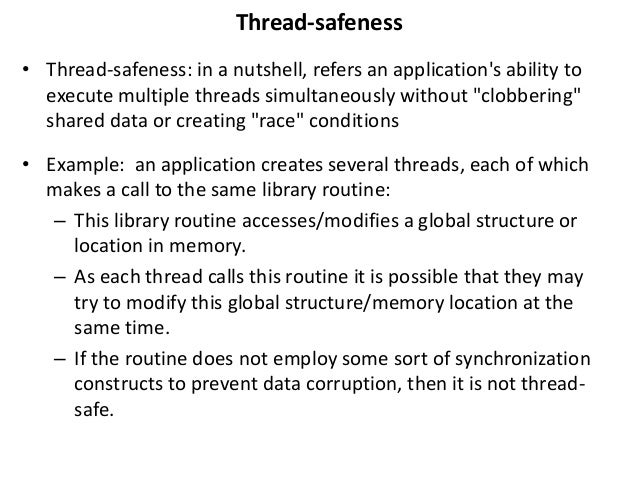
The same applies to a pthread condition variable.
#Pthread c shared memory how to
The following code demonstrates how to use pthread interprocess mutex. The attribute can be set by function pthread_mutexattr_setpshared or pthread_condattr_setpshared respectively. PTHREAD_PROCESS_SHARED permits a mutex/condition to be used by any thread that has access to the memory, even if the mutex/condition is in memory that’s shared by multiple processes. PTHREAD_PROCESS_PRIVATE is the default attribute, which only operates upon threads created within the same process that initialized the mutex/condition. There are two process-shared attribtues in pthread: Pthread mutex and condition also can be used for inter-process synchronization. The source code can be found on my GitHub channel. A read/write lock is also developed to sync the inter-process buffer read/write operations. For the simplicity and efficiency, shared memory is used to store the ring buffer. These issues can only be solved using the synchronization primitives of your threading library.This post explains how to implment a ring buffer that can be shared between multiple processes.


Multiple threads accessing the same memory location introduces new issues of memory visibility and ordering. So conforming implementations just have to ensure that loads and stores of volatile sig_atomic_t are atomic with respect to signals (on a single thread). There are no memory accesses by other threads to the volatile sig_atomic_t that the handler would write to. There is only a single thread of execution - which is interrupted long enough to execute the signal handler. Signals are dispatched by the OS directly to the task/thread that is to handle them. That aside, your logic is faulty in that signal handling and multi-threading are unrelated concepts. So it's not really an "argument", but more an exploration of "what behavior will I get from my compiler and hardware?". Under both standards, it's undefined behavior to access the same memory location by two or more threads where at least one is writing.

Therefore it must produce the protection in all contexts, including multi-thread contexts (again, the compiler has no way of knowing if a piece of code is multi-threaded or not). Main program code is indistinguishable from handler code - the compiler has no way to know whether a given piece of code is executed with signals masked, or in fact whether it is a signal handler at all. sig_atomic_t must be safely accessible from main program code and asynchronous handler code. If sig_atomic_t is a type which is implicitly protected by the compiler, then the compiler should generate the same protection regardless of context.

If sig_atomic_t is a type which is hardware atomic, then all accesses are safe regardless of context because the hardware guarantees it.Ģ. Therefore, if sig_atomic_t is safe in that context, then sig_atomic_t must either A) be of a type which is accessed atomically by the hardware, or B) be a type which is implicitly protected by compiler-generated locking primitives so that from the program's perspective, access is always atomic.ġ. A signal handler could interrupt execution at literally any point, including in the middle of a multi-word memory access. If memory access to a sig_atomic_t type is guaranteed atomic in the context of a signal handler, then it is atomic in any context. Only good for signal handlers.I realize the standard does not say it, but I'm going to make a heuristic argument that it's probably safe for multithread as well.


 0 kommentar(er)
0 kommentar(er)
